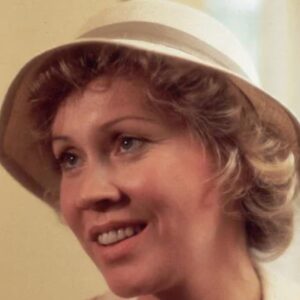
ABBA is one of the most renowned bands in the world today. Still regarded as a worldwide phenomenon, the Swedish group. One of the group’s members, Agnetha Faltskog, has chosen to live a life hidden from the public eye.
Faltskog, along with Anni-Frid Lyngstad, was one of ABBA’s lead singers. With some of her songs, she broke people’s hearts while simultaneously making them dance with an all-time great pop voice. However, more than anything, she and her bandmates became some of history’s most fascinating musical figures.
Faltskog now has a secure life in Sweden, but that doesn’t mean she has given up making music. She looks fantastic for 72 years old!

Few people can say they have yet to hear of ABBA. The band’s music makes 10-year-olds today probably dance as wildly as anyone. You attended the first performance of Waterloo or won’t give birth for another 30 years is irrelevant.
It can be challenging to pick a favorite ABBA song. ABBA became a global phenomenon because there is an ABBA song for every moment of our lives, whether joyful, sad, inspirational, or regretful.
Without a doubt, Agnetha Faltskog was. They are unique because, after the band’s dissolution, every member of ABBA essentially disappeared. They continued to write music but preferred to live a quiet life away from the spotlight.
Agnetha Faltskog’s inspiring story is about what happened to her after ABBA disbanded and how she first joined the group.
Agnetha was born in Sweden’s Jönköping on April 5, 1950. Birgit Margareta Johansson and Knut Ingvar Fältskog, a worker at a department store, welcomed her as the first of their two daughters.

A lifelong lover of music, Agnetha Faltskog. She was talented, and Dusty Springfield, Petula Clark, and Tom Jones were some of her favorite performers.
When Faltskog was only five years old, she composed a song about two little “trolls.”. She regularly practiced at her neighbor’s house before starting formal piano lessons when she was eight years old. She also sang in the choir at the neighborhood church.
In 1960, at just 13, Faltskog founded the band The Cambers with her two childhood friends. Before she decided it was time for something else two years later, they only gave a few small performances in the neighborhood.
Agneta joined the Swedish folk ensemble Bernt Enghardt. While the band traveled throughout Sweden, Swedish dancing music was played.

Agneta, a vocalist who left the group before me, recalls this. “When they first found me and after they posted job ads looking for a new vocalist, it was a big plus that I was also known as Agnetha, and I had an audition.”.
Faltskog continued to work as a telephonist for a car company while on tour with Bernt Enghardt, but things could have gone more smoothly for her.
She was due to report to work shortly after arriving home after midnight, “around two or three.”. She even collapsed at an auto manufacturer, and her mother gave her a choice.
Agnetha remembers her mother saying, “You can either devote yourself entirely to singing or work as a normal person. It was simply because I wanted to keep singing. ”.
Agnetha sang with the Bernt Enghardt band for another two years before departing to begin a solo career. Following the release of her debut solo album, she changed her last name to include an “h.”.

At 17, Faltskog’s debut single, Jag var s kär [I Was So In Love], was released to the public. Once it climbed to position no., Bjorn Ulvaeus heard it on the radio when it reached No. 1 on the Swedish sales chart in 1968.
I can still hear Agnetha’s first single playing on the radio. In the BBC documentary Agnetha: Abba and After, Benny said, “There was something so extraordinary about her voice and that she had written the song herself – it was beautiful.
Benny Andersson continued, “She performed a few good songs back-to-back. She sang along with herself and did an excellent performance.
Now, Bjorn and Benny were talented musicians who had previously worked together. Agnetha’s career took off after her first hit was released, and she was soon scheduled to perform with Bjorn Ulvaeus.

She and I performed a duet on the TV program we collaborated on. We had a real love affair that evening and married soon after. “That was an awesome moment,” he reflected.
Benny fell in love with Anni-Frid Lyngstad, another performer, as Agnetha and Bjorn collaborated on a piece.
Despite being four highly talented musicians in the same place, they had yet to make plans to form a band. Background vocalists Anni-Frid and Agnetha sang on the Bjorn and Benny album Lycka [Happiness] from 1970.
The four immediately started working together. In 1972, they released “People Need Love,” but it wasn’t particularly successful there. The group was now known as Björn and Benny, Agnetha & Anni-Frid. They decided to participate in Melodifestivalen, Sweden’s submission for the Eurovision Song Contest and sang the song Ring, Ring. Despite finishing third, the song became a massive hit in Sweden.
Ring, Ring gained traction in several European countries where it endured. The group was now becoming well-known throughout the world. In 1974, one year after they set out to do so, they succeeded.
They participated in Melodifestivalen once more, but this time they sang Waterloo. They decided that their band would have a new name before performing at the Eurovision Song Contest in Brighton, changing the course of musical history. They had triumphed at the Swedish qualifying round.
It was decided to form ABBA.
Although many consider ABBA’s victory at the Eurovision Song Contest their most cherished achievement, Agnetha had other ideas during that time.
Her first child, Linda, was born to her and Bjorn Ulvaeus in 1973 after their marriage. Agnetha was carrying a child simultaneously as the ABBA craze was gaining momentum daily.
It was undoubtedly difficult to have children as your tribe grew to be one of, if not the largest, on the planet.
Agnetha acknowledged that she was relieved that Ring Ring didn’t help them win the Melodifestivalen because she was only a few months away from giving birth to Linda.
Faltskog said, “I combined marriage, having kids, divorce, and global success during the 10 to 12 years we performed as ABBA. As I said earlier, it was challenging. It was hard to leave home, especially since Dad [Bjorn] was also gone. We ensured that our children were cared for while we were away.
We didn’t stay away as long as you might have thought. We made the decision that we would stay at home for 14 days if we were gone for 14.
Even though ABBA’s members all enjoyed phenomenal success on a global level, Agnetha struggled with having to leave her children.
It was so challenging that she told herself she might quit the group.
It was difficult, and I was unsure of my best action. How can we fix this?” I replied that we needed to spend the same time at home as we did on the tour. Agnetha continued.










